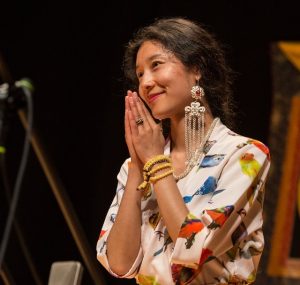In 2023, Equinox Publishing released The Gathering: A Story of the First Buddhist Women by Vanessa R. Sasson. A larger-than-average, quality paperback, it felt lovely in the hand and kind on the eyes.
The Gathering recounts the challenges faced by the first Buddhist women who sought ordination from the Buddha some 2,600 years ago. Initially rebuffed, and then confronted with demanding conditions upon acceptance, these resilient women shared poems highlighting their struggles and triumphs. Despite societal hierarchies and hardships, they pursued ordained spiritual awakening, overcoming numerous barriers, and also found something with which many people today still grapple: a sense of belonging.
Vanessa looked to the Buddhist monastic code in the Vinaya, particularly in its Pali version, as a primary source for the story of these women’s quest, as the Vinaya offers a structured account. But the heart and soul of this retelling comes from the Therigatha, a collection of 73 poems attributed to the first Buddhist women who joined the monastic sangha: women of diverse backgrounds and stations in life, where the focus is on their personal stories rather than just the rules and codes. This is considered a precious and unique source offering a distinct perspective compared with other early Buddhist texts attributed mainly to men. The Therigatha provides a window into the individual experiences, struggles, and successes of these women, and their perseverance—a microcosmic experience in the macrocosmic struggle for equality (which does not mean the same as) and spiritual fulfillment. Vanessa also spent many years with contemporary female monastics, gaining a real-life-experience perspective that has contributed to shaping her understanding of the story of the first Buddhist women.
Vanessa’s book reminds us of the enduring impact that these stories have had on contemporary Buddhist practitioners, and of the ongoing debate around women’s ordination in monastic communities. We are cautioned that this book may be a tough read—and at times it was; I felt the swell of my righteous indignation, not only for these women from so long ago, but for any of my fellow humans suffering at the hands of a suppressor. And cultural suppression is so chronic that it has become a repression of which many are blindly unconscious. At times, I became quite emotional. I felt the suffering of the characters with whom I had become involved, and I felt the deep sorrow of thousands upon thousands of suffering beings in our world. However, that does not mean that this is a depressing read. Far from it.
We begin with a first-person narrative and a conversational tone. Vanessa writes in a style that blends a sense of warmth and familiarity with a touch of humor, employing dialogue, inner thoughts, and descriptive details, as all good stories should. And before we know it, the reader is transported to ancient India and into another story, which doesn’t merely bring the characters and their interactions to life but plants us squarely in their world. I confess that, at times, I even felt the dialogue was aimed directly at me.
Given the private nature of the conversations and motivations, many elements presented as fact in such books are often imagined. This is because we naturally have no firsthand insights into what transpired behind closed doors. However, maintaining what feels like a personal conversation with the reader, Vanessa includes a comprehensive notes section at the end of her book, where she discusses which aspects are factually historical, which are not, and the reasons behind those choices. This section, devoid of spoilers, could be read prior to the main content of the book, as it provides a rich background and context for the characters, both real and imagined.
The book pokes us to consider the themes of motherhood, suffering, and gender roles within Buddhism, as well as the institution of Buddhist rules, such as the “Eight Heavies,” which some scholars view as detrimental. Vanessa brings to light the historical and ongoing struggle for women’s equal access to religious traditions, and poses introspective questions about renunciation and liberation, and the essence of liberation: whether it lies in the renunciation of the world or the embrace of it; whether progress is but a mirage on the long march for equality; and whether motherhood’s bond can transcend the act of letting go. This is a story not only of seeking, but of questioning, of looking within, and of asking if the path of renunciation could indeed be one’s own passage to freedom.
At the end of the book, the author poses some pertinent study questions for us to contemplate. It is indeed worthy of a book club discussion. It is also worthy of being made into a beautiful film.
However, one lingering question that I took from the bulk of the book and not from the study questions was a deceptively simple one: How many of us have sleepwalked through our lives?
This book does more than merely tell a story, it promotes deep reflection.
After a round of reading at the end of the day, I slept in ancient India, so grateful to be a free woman today with the privilege of my present existence . The freedom I enjoy stands in stark contrast to the historical injustices that have plagued women across epochs.
Even so, the story reminded me of the relentless societal judgments that persist regardless of our actions. Whether we choose to act or abstain, our gender becomes the fulcrum upon which judgments teeter. In the notes, Vanessa quotes a vile piece of misogynistic text from the Buddhacharita,* a poignant reminder of prevailing attitudes toward our maternal lineage. Even within the revered Buddhist world, misogyny found its insidious foothold. The ancient past, often romanticized, revealed the repugnant standard: men asserting their testosterone-fueled liberties, taking what they want, while simultaneously condemning the very women they exploited or abused. Perhaps, it is even more disheartening when women themselves perpetuate this cycle of judgment and turn on each other.
It is so baffling to me that the same species can harbor such animosity toward itself, with venomous words hurled across gender lines—especially when our shared biological instinct is for happiness and procreation. Yet these women are the mothers, the sisters, and the daughters. Why disdain the gender that creates life? By the same token, I see so much from women today that makes me incredibly sad, frustrated, and, at times, downright angry. The suffragettes fought valiantly for freedoms that women now take for granted and squander. Yes, we have the freedom to do that, but what a shame when behavior becomes ignorant, vapid, and vulgar. Simultaneously, society is now seeing male suicides at an all-time high.
Perhaps one of humanity’s gravest errors was labeling primal forces with gender and distinct personalities; and their energy became character traits for humans and an assumed hierarchy. Instead, I find solace in the yin and yang—the balance of energies wherein both masculine and feminine forces dance harmoniously.
Vanessa also covers issues that I, too, have felt were overlooked by “romantic” neo-Buddhists as well as the established patriarchal mindset. For starters, the question is raised regarding the very beginning of Siddhartha Gautama’s journey: leaving his family and the endorsement of emotional severance to do what he wanted to do, which is, dare I suggest, only a step away from endorsing today’s common label of dispassionate sociopathic narcissism. As we all descend the mountain of detachment, that’s when the challenges begin, even when we see the illusion of reality.
Like the Bible, the Buddhist teachings were filtered through many personalities before they eventually found their way to the written word and into religious legacy. There is no doubt that human culture had devolved into one of domination and subjugation between the genders (something we do not see the same evidence of, the further back in history we go), and this will undoubtedly have biased the pages. However, I offer you this thought that floats through my mind: the Awakened One was born a male in a patriarchal world, but as we know, an awakened mind is beyond gender. The female gathering asked the Buddha’s permission for ordination and his response was: “It is not a good idea to ask the question.” Could it suggest that permission was never needed? However, rules in accordance with the prevailing culture would have to be enforced if they did ask, as too many men could never control themselves. Little boys will often pick on the little girl they secretly crush on, as it’s easier to be mean than to be vulnerable.
As is stated in Native American wisdom: “A woman has intuitive thought. She has access to another system of knowledge that few men develop.”
perhaps this is why men must abstain and learn to harness that irrepressible driving creative force and transcend the limits of their testosterone meat-sack. Equally, many incarnated as women have yet to remember their wisdom, as the Cherokee saying goes:
“A woman’s highest calling is to lead a man to his soul, so as to unite him with Source. Her lowest calling is to seduce, separating man from his soul and leave him aimlessly wandering. A man’s highest calling is to protect woman, so she is free to walk the Earth unharmed. Man’s lowest calling is to ambush and force his way into the life of a woman.”
There is so much contained within this book, with examples of lives that act as contemporary mirrors, I do not wish to labor the details. Instead, I simply urge you to read it.
Finally, one of a couple of unexpected, possibly unintentional, musical pop cultural references embedded within this book took me by pleasant surprise and set off an ear-worm as I read. As I conclude my review-induced little rant, I feel it my parting gift to share this with you, my dear reader. It was not before I appreciated the poignant and layered relevance of the song to the story. In this case, it was Pink Floyd’s “Shine On You Crazy Diamond.”
You’re welcome!
* The future Buddha is written to have thought to himself: “Dirty and distorted lies here exposed the true nature of women in this world,” as women lay sleeping, having been used in pleasurable ways. What this says about the man who read the Buddha’s thoughts and wrote them down, is potentially telling.
See more
The Gathering: A Story of the First Buddhist Women (Equinox Publishing)
Vanessa R. Sasson
Related features from BDG
Book Review: Embodying Tara: Twenty-One Manifestations to Awaken Your Innate WisdomBook Review: Red Tara: The Female Buddha of Power and Magnetism
Book Review: How We Live Is How We Die by Pema Chödrön
















